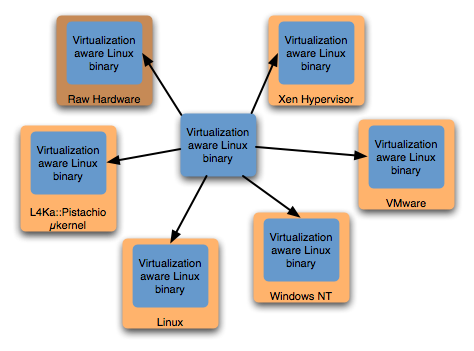Pre-Virtualization with Compiler Afterburning
Pre-virtualization is a virtual machine construction technique that combines the performance of para-virtualization with the modularity of traditional virtualization. Modularity is the common factor in the applications of virtualization, whether server consolidation, operating system migration, debugging, secure computing platforms, or backwards compatibility. Many of these scenarios have strong trade-offs, e.g, security versus performance, and virtual machines easily address these scenarios and trade-offs via substitution of different hypervisors that are specialized for the scenarios. Pre-virtualization provides performance, but without creating strong dependencies between the guest operating system and the hypervisor; pre-virtualization maintains hypervisor neutrality, and guest operating system neutrality.

Our Afterburner project automates the application of pre-virtualization to a guest operating system. The automation brings quick access to a high-performance virtualization environment, especially for kernels that are no longer maintained and thus unlikely to receive the attention necessary for manual application of Virtual Machine Interface (VMI).
Our Afterburner produces binaries that execute on raw hardware, our L4Ka::Pistachio microkernel, and the Xen hypervisor (v2 and v3). The Afterburner automatically locates virtualization-sensitive instructions, pads them with scratch space for runtime instruction rewriting, and annotates them.
One advantage of our automated approach is that it works for devices too. For example, we automatically instrument the DP83820 gigabit ethernet driver, so that when executing in a virtual machine, we have very high-performance virtualized networking while using Linux's standard DP83820 network driver. Typical virtual machine environments write a custom network device driver for the guest OS to obtain high performance; since we automate the virtualization, we quickly enable high-performance virtual machines for a variety of kernels, particularly older kernels.
Contact: Prof. Dr.-Ing. Frank Bellosa
| Author | Title | Source |
|---|---|---|
Joshua LeVasseur, Volkmar Uhlig, Matthew Chapman, Peter Chubb, Ben Leslie, and Gernot Heiser |
Pre-Virtualization: Soft Layering for Virtual Machines | Technical Report 2006-15, Fakultät für Informatik, Universität Karlsruhe, July 2006 |
Joshua LeVasseur, Volkmar Uhlig, Matthew Chapman, Peter Chubb, Ben Leslie, Gernot Heiser |
Pre-Virtualization: Slashing the Cost of Virtualization | Fakultät für Informatik, Universität Karlsruhe (TH), Technical Report 2005-30, November 2005 |
Joshua LeVasseur, Volkmar Uhlig, Ben Leslie, Matthew Chapman and Gernot Heiser |
Pre-Virtualization: Uniting Two Worlds | Poster session of 20th ACM Symposium on Operating Systems Principles (SOSP-20), October 23-26, 2005, Brighton, United Kingdom |
